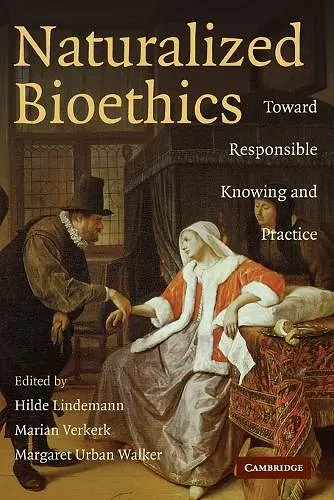Naturalized Bioethics
Toward Responsible Knowing and Practice
Margaret Urban Walker editor Hilde Lindemann editor Marian Verkerk editor
Format:Paperback
Publisher:Cambridge University Press
Published:13th Oct '08
Currently unavailable, and unfortunately no date known when it will be back
This paperback is available in another edition too:
- Hardback£75.00(9780521895248)

This book presents a new framework for addressing ethical issues in health care, moving beyond traditional moral theories to a more inclusive approach.
In Naturalized Bioethics, the author argues for a transformative approach to bioethics that moves away from traditional utilitarian frameworks and ideal moral theories. By advocating for a self-reflexive, socially inquisitive, and politically critical ethics, the book emphasizes the importance of inclusivity in ethical considerations. This shift is particularly crucial for bioethicists and health care professionals who navigate complex ethical landscapes in their practice.
The text critically examines the limitations of idealized ethical models, urging practitioners to remain grounded in the realities of diverse social contexts. The naturalism presented in Naturalized Bioethics is informed by empirical insights, stressing that ethical theories must be relevant to the specific people, cultures, and environments in which they operate. Through a series of essays, the book situates bioethicists within the intricate web of relationships that characterize health care settings, highlighting the influence of various power dynamics.
Ultimately, Naturalized Bioethics serves as a guide for professionals across the health care spectrum, including doctors, nurses, and researchers, to engage with ethical dilemmas in a more nuanced and context-aware manner. By fostering a deeper understanding of the interconnectedness of ethical issues, the book aims to empower practitioners to navigate the challenges they face in delivering compassionate and equitable care.
“…Naturalized Bioethics is an excellent anthology, well-worth reading. Many of the issues it raises are in fact new and it deepens our understanding of concepts such as autonomy and responsibility. Also welcome is the book’s persistent focus on power issues. In this connection, I found the concluding chapter particularly good. In it, Verkerk and Lindemann plead with bioethicists to rethink their own professional identity. Bioethicists are not ethics experts in the sense of being more morally right or morally good than other people…Bioethicists are the enablers of moral conversation. It may begin with them, but it should not end with them -- at least not in the real/natural world in which we actually live.” Rosemarie Tong, University of North Carolina at Charlotte, Notre Dame Philosophical Reviews
ISBN: 9780521719407
Dimensions: 230mm x 151mm x 14mm
Weight: 400g
292 pages